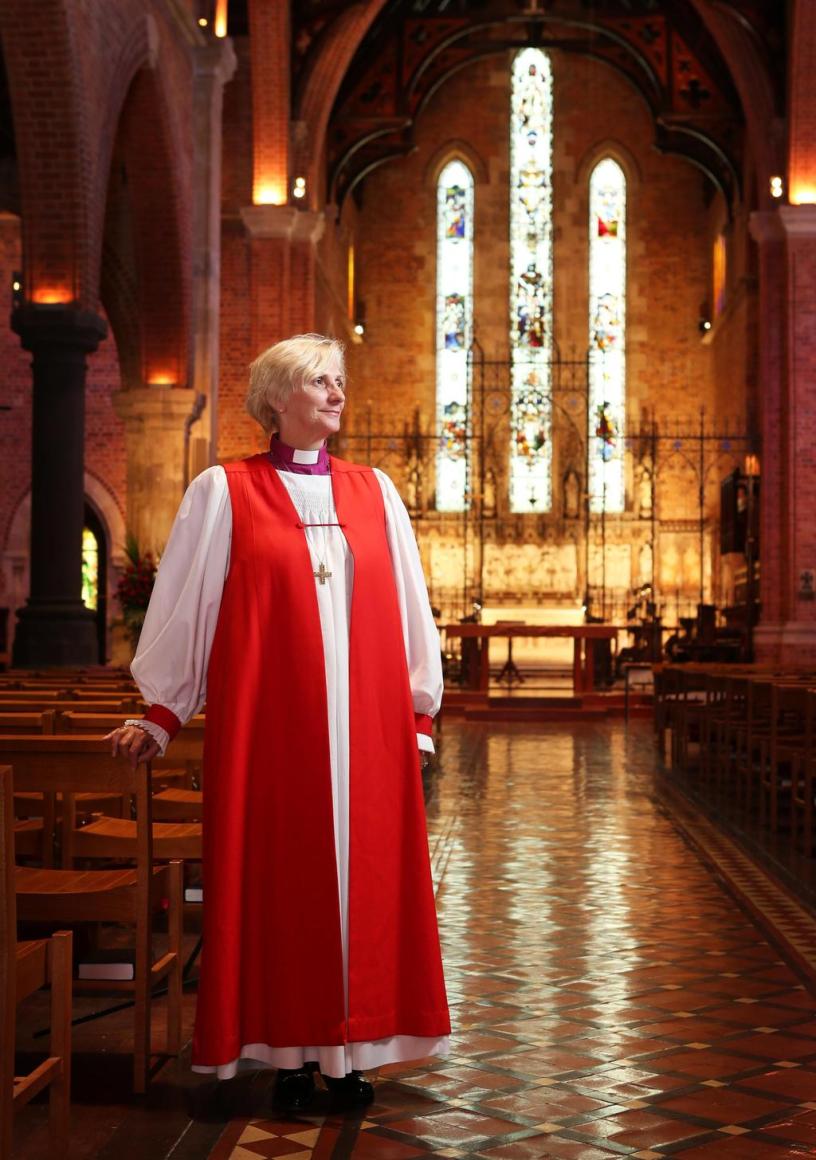Julia Baird has written an opinion piece today (Saturday 16th September 2023) in the Sydney Morning Herald on the visit of the Archbishop of Perth Kay Goldsworthy to Sydney. The diocese of Sydney is officially complementarian, which leads to rather odd contradictions, especially when it comes to observing the ethics of the Scriptures. As Baird writes:
The most powerful woman in the Australian Anglican Church, the Archbishop of Perth Kay Goldsworthy, will be preaching in the Sydney Diocese – a place where women are not allowed to be priests or lead congregations that contain men. Here, Goldsworthy can’t be an archbishop, a bishop or even just a priest once her plane’s wheels hit the tarmac in Sydney – she can only operate on the lowest rung of the clergy, as a deacon.
These rules came about during the time when Glenn Davies was archbishop, as Baird explains:
Davies pointed out that these bishops must operate as deacons in Sydney, with an important caveat: they cannot contravene Sydney Diocese’s “understanding of the restrictions of the apostle in 1 Timothy 2:12.”
The problem with complementarianism is that it leads to contradictions in how the Scriptures are applied. The treatment of Archbishop Goldsworthy stands in contradiction to the overall goal of 1 Timothy:
The goal of this command is love, which comes from a pure heart and a good conscience and a sincere faith.
1 Timothy 1:5
Let’s remind ourselves about what the Apostle Paul says about love:
Love is patient, love is kind. It does not envy, it does not boast, it is not proud. It does not dishonor others, it is not self-seeking, it is not easily angered, it keeps no record of wrongs.
1 Corinthians 13:4-5 (NIV)
Any application of the instructions in 1 Timothy should not break the principle set out at the beginning of the letter. The principle is there because ‘certain people’ (1 Timothy 1:3, 6; 4:1; 6:3), men (1 Timothy 1:20) and women (1 Timothy 2:12; 5:13), have been causing nasty disputes over a new form of teaching that has entered the church (1 Timothy 1:3-7). The ‘certain people’ are behaving in an arrogant fashion and lording it over others:
Some have departed from these and have turned to meaningless talk. They want to be teachers of the law, but they do not know what they are talking about or what they so confidently affirm.
1 Timothy 1:6-7 (NIV)
Listen to how bad things are in the congregation:
If anyone teaches otherwise and does not agree to the sound instruction of our Lord Jesus Christ and to godly teaching, they are conceited and understand nothing. They have an unhealthy interest in controversies and quarrels about words that result in envy, strife, malicious talk, evil suspicions and constant friction between people of corrupt mind, who have been robbed of the truth and who think that godliness is a means to financial gain.
1 Timothy 6:3-5 (NIV)
The congregation is being wracked by controversies and quarrels about words, so much so that two of the members have been excluded from the community.[1] In the writer’s opinion, these men are arrogant and ignorant and only interested in themselves and their comfortable living (1 Timothy 1:6-7; 6:5). They are not interested in what their teaching and commands (1 Timothy 6:1-5) are doing to others.[2] Hence, the writer of 1 Timothy begins his instructions to this congregation by stating the principle by which they should conduct themselves: love.
According to Paul, love means thinking about the dignity of the other person and respecting them: love does not “dishonour others.” Over in Titus, the older men and the older women are urged to be “worthy of respect” and to “be reverent in the way they live,” respectively. The reason is that they are to be respected as older members of the congregation. In traditional societies, the older person (their gender is irrelevant) is to be respected. I am not an Anglican, but I would think that an archbishop is to be considered as an elder, who has been granted special honour in his or her community (1 Timothy 5:18). I would like to urge my fellow Christian brothers in the Sydney Diocese that in future they should treat any female archbishops visiting the diocese with the respect that is due to them because that is at the heart of the instructions in 1 Timothy. It’s not about telling women what they can’t do because that is what the other teachers, Hymenaeus and Alexander have been rebuked over.[3]
© Lyn M. Kidson, September 2023.
Dr Lyn Kidson is the author of Persuading Shipwrecked Men: Rhetorical Strategies of 1 Timothy 1. WUNT 526. Tübingen: Mohr Siebeck, 2020.
Want More?
Become my patron and have access to my writing on gender, sexuality, and the historical background to the New Testament exclusive to you, ask me questions, and generally follow me along my research journey (I often go to exciting places).
Or Donate
If you’ve found this article helpful you can support my ministry and research by making a contribution (suggested US $5)
Recommended Reading
Women and Teaching in 1 Timothy: A Response to John Piper
Women and Overseers in 1 Timothy
Other articles on Engendered Ideas
Notes
Image from the Movement for the Ordination of Women website.
[1] Lyn M. Kidson, Persuading Shipwrecked Men: Rhetorical Strategies of 1 Timothy 1. WUNT 526 (Tübingen: Mohr Siebeck, 2020), 270-271; Adam G. White, Paul, Community, and Discipline: Establishing Boundaries and Dealing with the Disorderly. Paul in Critical Contexts (London: Lexington Press/Fortress Academic, 2021), 217-232.
[2] Lyn M. Kidson, “Fasting, Bodily Care, and the Widows of 1 Timothy 5:3–15.” Early Christianity 11, no. 2 (2020): 191–205. https://doi.org/10.1628/ec-2020-0016.
[3] Kidson, “Fasting, Bodily Care, and the Widows of 1 Timothy 5:3–15,” 202-205.
